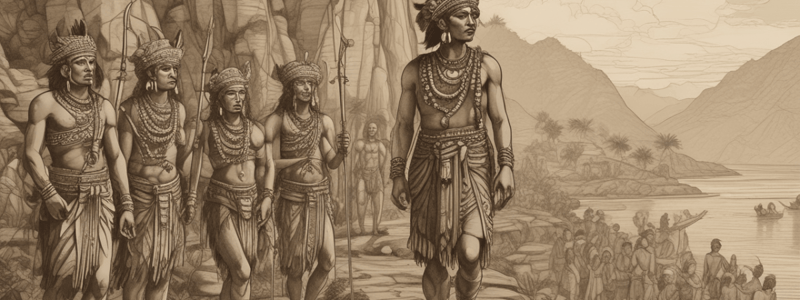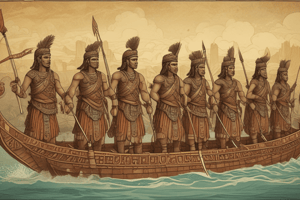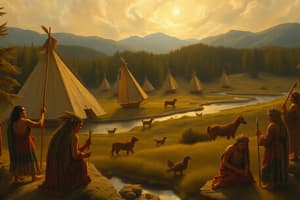Podcast
Questions and Answers
What was the main reason for the gathering of the First Continental Congress in 1774?
What was the main reason for the gathering of the First Continental Congress in 1774?
- To prepare for the Battle of Lexington and Concord
- To sign the Declaration of Independence
- To declare independence from Britain
- To respond to the Intolerable Acts and fight for representation in British Parliament (correct)
What was the significance of the battles of Lexington and Concord?
What was the significance of the battles of Lexington and Concord?
- They marked the end of the American Revolutionary War
- They led to the signing of the Declaration of Independence
- They resulted in the British surrendering to the Americans
- They proved the Patriot militias and minutemen were ready to fight against the British (correct)
What was the main goal of the British during the battles of Lexington and Concord?
What was the main goal of the British during the battles of Lexington and Concord?
- To capture American Patriot leaders
- To occupy American cities
- To negotiate a peace treaty
- To take colonial arms stores (correct)
What major event occurred on April 19, 1775?
What major event occurred on April 19, 1775?
What was the result of the battles of Lexington and Concord for the American Patriots?
What was the result of the battles of Lexington and Concord for the American Patriots?
What major event occurred after the battles of Lexington and Concord?
What major event occurred after the battles of Lexington and Concord?
What was the main issue that led to the gathering of the First Continental Congress?
What was the main issue that led to the gathering of the First Continental Congress?
What was the significance of the Battle of Bunker Hill?
What was the significance of the Battle of Bunker Hill?
What document was signed after the Second Continental Congress?
What document was signed after the Second Continental Congress?
What was the main goal of the American Patriots during the American Revolutionary War?
What was the main goal of the American Patriots during the American Revolutionary War?
What was the result of the boycott on British goods?
What was the result of the boycott on British goods?
Where did the first battles of the American Revolutionary War take place?
Where did the first battles of the American Revolutionary War take place?
What was the primary motivation of the Patriot colonists?
What was the primary motivation of the Patriot colonists?
What was the outcome of the skirmishes at Lexington and Concord?
What was the outcome of the skirmishes at Lexington and Concord?
What major event occurred in 1775?
What major event occurred in 1775?
What was the significance of the Battles of Lexington and Concord?
What was the significance of the Battles of Lexington and Concord?
What was the main issue that led to the American Revolutionary War?
What was the main issue that led to the American Revolutionary War?
What was the outcome of the Second Continental Congress?
What was the outcome of the Second Continental Congress?
What was the primary goal of the British during the American Revolutionary War?
What was the primary goal of the British during the American Revolutionary War?
What was the result of the Battle of Bunker Hill?
What was the result of the Battle of Bunker Hill?
What was the main goal of the Patriot colonists during the American Revolutionary War?
What was the main goal of the Patriot colonists during the American Revolutionary War?
What was the significance of the First Continental Congress?
What was the significance of the First Continental Congress?
What was the outcome of the battles of Lexington and Concord?
What was the outcome of the battles of Lexington and Concord?
What event followed the battles of Lexington and Concord?
What event followed the battles of Lexington and Concord?
What was the main goal of the boycott on British goods?
What was the main goal of the boycott on British goods?
What was the significance of the Battle of Bunker Hill?
What was the significance of the Battle of Bunker Hill?
What was the main issue that led to the American Revolutionary War?
What was the main issue that led to the American Revolutionary War?
What was the significance of the Second Continental Congress?
What was the significance of the Second Continental Congress?
What was the main goal of the British during the American Revolutionary War?
What was the main goal of the British during the American Revolutionary War?
What was the result of the skirmishes at Lexington and Concord?
What was the result of the skirmishes at Lexington and Concord?
Flashcards are hidden until you start studying
Study Notes
Early American History
- Three theories of how people arrived in the Americas: Bering Land Bridge, Atlantic Theory, and Oceania Theory
- Thousands of years ago, people migrated from other continents to the Americas
- Native Americans thrived in North America before European colonization, with diverse cultures and beliefs
Native American Cultures
- Northwestern Coastal Native Americans: skilled fisherman and artists, created totem poles, held potlatches
- Southwest Native Americans: nomadic, created intricate irrigation systems, famous for sandstone architecture
- Northeastern Tribes: mainly agrarian, migrated with seasons, hunted deer
- Southeastern Tribes: "Civilized tribes", interested in European economy and culture, known for beadwork, basket-weaving, and pottery
- Great Plains Natives: nomadic, followed herds of buffalo, skilled horseback-riders
European Exploration and Colonization
- The Old World: Europe, Africa, and Asia
- The New World: the Americas
- Age of Discovery: Europeans explored the New World for silks, spices, and new crops, and to spread Catholicism
- Columbus and other explorers led to the Columbian Exchange, exchanging goods and people between the Old and New Worlds
Spanish Colonization
- Land grants called haciendas were given to Spanish conquistadors
- Encomienda system: granted labor from indigenous people and Spanish colonists
- Notable explorers: Hernan Cortes, Juan Ponce de Leon, Francisco Pizarro, and Hernando de Soto
- New Spain: Spanish land holdings in the New World, including Mexico, Caribbean, Central America, and Southwestern United States
French Colonization
- France established the colony of New France, spanning eastern Canada, Great Lakes Region, and Mississippi River
- Initial motivation: finding the mythical Northwest Passage
- French explorers established positive relations with indigenous people, traded for furs and pelts
- Notable explorers: Jacques Cartier, Jacques Marquette, and Louis Joliet
English Colonization
- Jamestown: the first permanent English settlement in North America, founded in 1607
- Financed by the Virginia Company, a joint-stock company
- First cash crop: tobacco, grown by John Rolfe
- Pocahontas, daughter of Powhatan, served as a liaison between Native Americans and English
13 Colonies
- 13 British colonies in the United States lived in a delicate balance of control and freedom
- Economic system: mercantile, with Britain controlling production and trade
- Colonists were only allowed to produce raw materials, which Britain turned into finished products and sold back to the colonists
- Enslaved people replaced indentured servants as the primary source of labor in Jamestown
French and Indian War
- Caused by French and British imperialism and expansionist goals
- Border disputes led to the war, which ended with the French ceding territory east of the Mississippi River
- British taxed American colonists to finance the war, adding fuel to the American Revolution
American Revolution
- Sons of Liberty, led by Samuel Adams, protested taxation policies and advocated for colonial rights
- British passed a series of taxes, including the Stamp Act, leading to colonial unrest and boycotts
- Boston Massacre and Boston Tea Party escalated tensions, leading to the Intolerable Acts and the American Revolution
- First Continental Congress formed in response to British actions, leading to the fight for representation in British Parliament
Early American History
- Three theories of how people arrived in the Americas: Bering Land Bridge, Atlantic Theory, and Oceania Theory
- Thousands of years ago, people migrated from other continents to the Americas
- Native Americans thrived in North America before European colonization, with diverse cultures and beliefs
Native American Cultures
- Northwestern Coastal Native Americans: skilled fisherman and artists, created totem poles, held potlatches
- Southwest Native Americans: nomadic, created intricate irrigation systems, famous for sandstone architecture
- Northeastern Tribes: mainly agrarian, migrated with seasons, hunted deer
- Southeastern Tribes: "Civilized tribes", interested in European economy and culture, known for beadwork, basket-weaving, and pottery
- Great Plains Natives: nomadic, followed herds of buffalo, skilled horseback-riders
European Exploration and Colonization
- The Old World: Europe, Africa, and Asia
- The New World: the Americas
- Age of Discovery: Europeans explored the New World for silks, spices, and new crops, and to spread Catholicism
- Columbus and other explorers led to the Columbian Exchange, exchanging goods and people between the Old and New Worlds
Spanish Colonization
- Land grants called haciendas were given to Spanish conquistadors
- Encomienda system: granted labor from indigenous people and Spanish colonists
- Notable explorers: Hernan Cortes, Juan Ponce de Leon, Francisco Pizarro, and Hernando de Soto
- New Spain: Spanish land holdings in the New World, including Mexico, Caribbean, Central America, and Southwestern United States
French Colonization
- France established the colony of New France, spanning eastern Canada, Great Lakes Region, and Mississippi River
- Initial motivation: finding the mythical Northwest Passage
- French explorers established positive relations with indigenous people, traded for furs and pelts
- Notable explorers: Jacques Cartier, Jacques Marquette, and Louis Joliet
English Colonization
- Jamestown: the first permanent English settlement in North America, founded in 1607
- Financed by the Virginia Company, a joint-stock company
- First cash crop: tobacco, grown by John Rolfe
- Pocahontas, daughter of Powhatan, served as a liaison between Native Americans and English
13 Colonies
- 13 British colonies in the United States lived in a delicate balance of control and freedom
- Economic system: mercantile, with Britain controlling production and trade
- Colonists were only allowed to produce raw materials, which Britain turned into finished products and sold back to the colonists
- Enslaved people replaced indentured servants as the primary source of labor in Jamestown
French and Indian War
- Caused by French and British imperialism and expansionist goals
- Border disputes led to the war, which ended with the French ceding territory east of the Mississippi River
- British taxed American colonists to finance the war, adding fuel to the American Revolution
American Revolution
- Sons of Liberty, led by Samuel Adams, protested taxation policies and advocated for colonial rights
- British passed a series of taxes, including the Stamp Act, leading to colonial unrest and boycotts
- Boston Massacre and Boston Tea Party escalated tensions, leading to the Intolerable Acts and the American Revolution
- First Continental Congress formed in response to British actions, leading to the fight for representation in British Parliament
Early American History
- Three theories of how people arrived in the Americas: Bering Land Bridge, Atlantic Theory, and Oceania Theory
- Thousands of years ago, people migrated from other continents to the Americas
- Native Americans thrived in North America before European colonization, with diverse cultures and beliefs
Native American Cultures
- Northwestern Coastal Native Americans: skilled fisherman and artists, created totem poles, held potlatches
- Southwest Native Americans: nomadic, created intricate irrigation systems, famous for sandstone architecture
- Northeastern Tribes: mainly agrarian, migrated with seasons, hunted deer
- Southeastern Tribes: "Civilized tribes", interested in European economy and culture, known for beadwork, basket-weaving, and pottery
- Great Plains Natives: nomadic, followed herds of buffalo, skilled horseback-riders
European Exploration and Colonization
- The Old World: Europe, Africa, and Asia
- The New World: the Americas
- Age of Discovery: Europeans explored the New World for silks, spices, and new crops, and to spread Catholicism
- Columbus and other explorers led to the Columbian Exchange, exchanging goods and people between the Old and New Worlds
Spanish Colonization
- Land grants called haciendas were given to Spanish conquistadors
- Encomienda system: granted labor from indigenous people and Spanish colonists
- Notable explorers: Hernan Cortes, Juan Ponce de Leon, Francisco Pizarro, and Hernando de Soto
- New Spain: Spanish land holdings in the New World, including Mexico, Caribbean, Central America, and Southwestern United States
French Colonization
- France established the colony of New France, spanning eastern Canada, Great Lakes Region, and Mississippi River
- Initial motivation: finding the mythical Northwest Passage
- French explorers established positive relations with indigenous people, traded for furs and pelts
- Notable explorers: Jacques Cartier, Jacques Marquette, and Louis Joliet
English Colonization
- Jamestown: the first permanent English settlement in North America, founded in 1607
- Financed by the Virginia Company, a joint-stock company
- First cash crop: tobacco, grown by John Rolfe
- Pocahontas, daughter of Powhatan, served as a liaison between Native Americans and English
13 Colonies
- 13 British colonies in the United States lived in a delicate balance of control and freedom
- Economic system: mercantile, with Britain controlling production and trade
- Colonists were only allowed to produce raw materials, which Britain turned into finished products and sold back to the colonists
- Enslaved people replaced indentured servants as the primary source of labor in Jamestown
French and Indian War
- Caused by French and British imperialism and expansionist goals
- Border disputes led to the war, which ended with the French ceding territory east of the Mississippi River
- British taxed American colonists to finance the war, adding fuel to the American Revolution
American Revolution
- Sons of Liberty, led by Samuel Adams, protested taxation policies and advocated for colonial rights
- British passed a series of taxes, including the Stamp Act, leading to colonial unrest and boycotts
- Boston Massacre and Boston Tea Party escalated tensions, leading to the Intolerable Acts and the American Revolution
- First Continental Congress formed in response to British actions, leading to the fight for representation in British Parliament
Studying That Suits You
Use AI to generate personalized quizzes and flashcards to suit your learning preferences.




